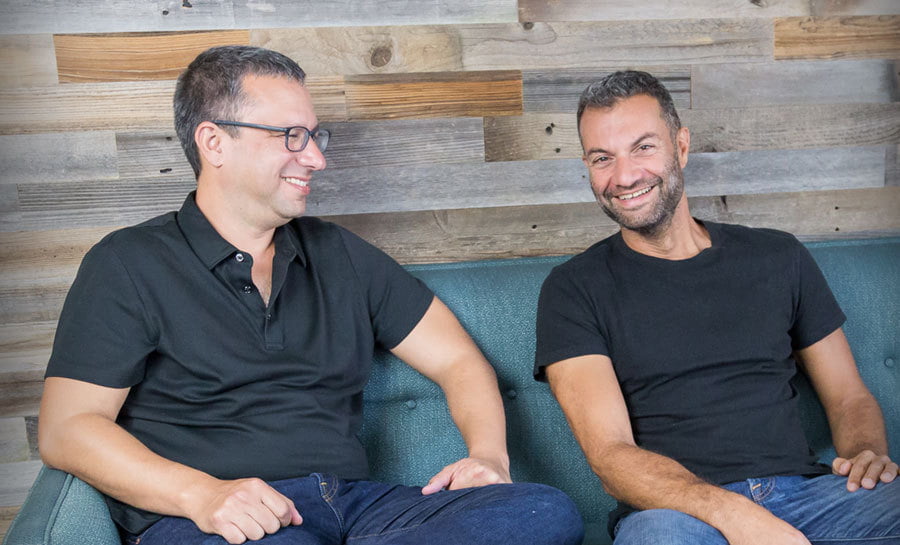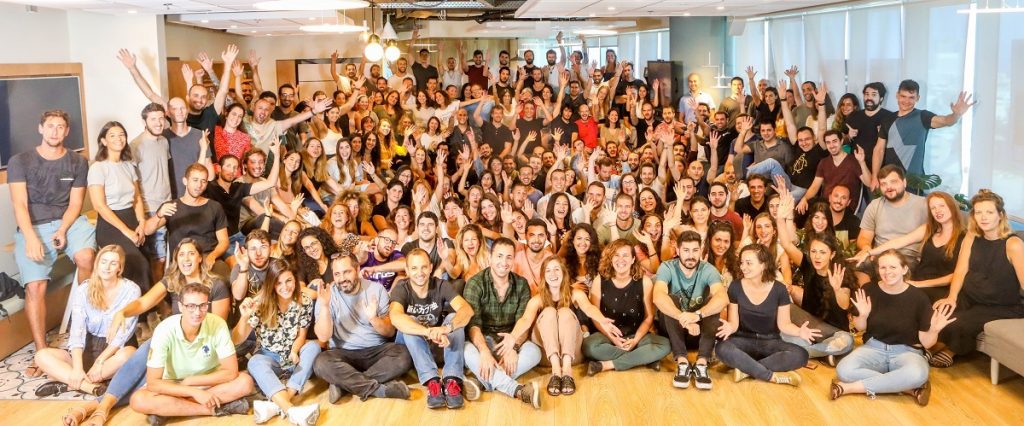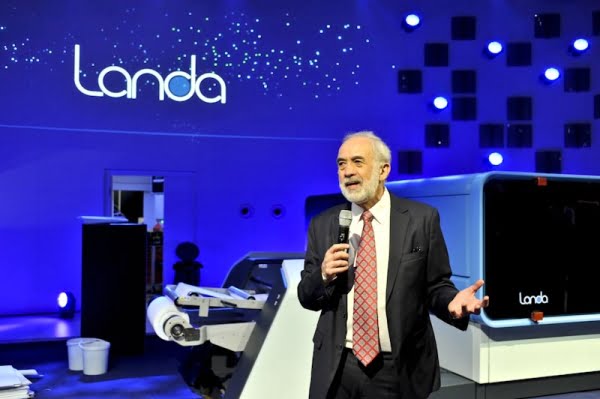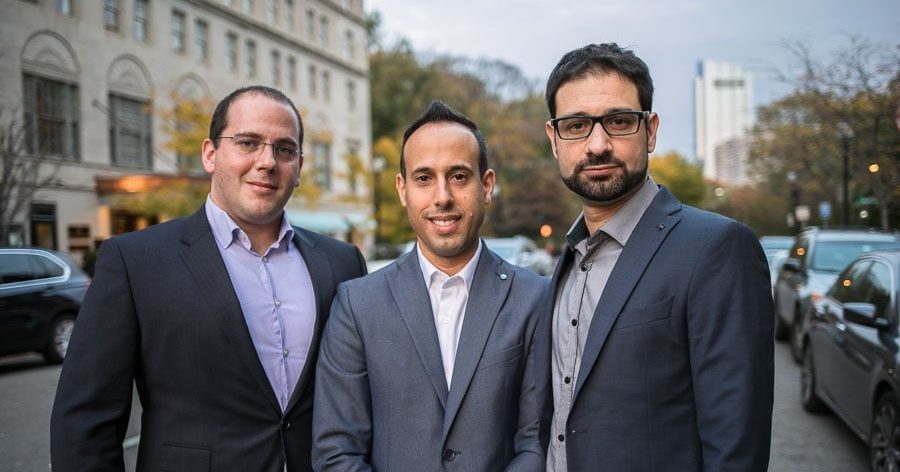While Israelis make up 0.11 percent of the global population, with just approximately 9 million people, Israeli founders are behind a staggering 5.62 percent of existing unicorns today (private companies valued at $1 billion or more).
As of December 2019, out of over 500 unicorns currently out there according to a list compiled by Techcrunch, 30 were founded by Israelis. And at least 13 of them became unicorns over the past year.
This is based on research by Yaron Samid, an Israeli entrepreneur with several exits under his belt, an angel investor, and the founder of TechAviv, a global community for Israeli founders. In 2018, Samid published his first list of Israeli-founded unicorns where he tallied 18 total, including WeWork, VIA, Lemonade, Fiverr, Taboola, Outbrain, OrCam, and eToro. By 2019, Fiverr had gone to IPO as had data company Elastic – making them public companies – and Taboola and Outbrain had merged.
The original list was criticized for including companies with only loose connections to Israel (like Magic Leap) and those without a presence in the country at all. Indeed, the updated list (as of December 16, 2019) of 30 companies includes Formlabs and Tango, each with one Israeli founder (out of several), and neither with a presence in Israel.
Samid notes that the round-up is not a list of “Israeli companies” but of “private technology companies founded by Israelis,” regardless of headquarters. The goal, reads a caveat on the site, “is to shine a light on the massive impact Israeli founders are having on the global innovation economy.”
In an interview with NoCamels, Samid says that one of the most surprising observations about this year’s list of Israeli-founded companies with valuations of over $1 billion is the sheer number of ventures reaching new unicorn status. Samid also keeps a round-up of “charging ponies” or companies valued at half a billion US dollars or more, with 27 and counting as of December 2019. These include Moovit, SiSense, Kaltura, Vayyar, SimilarWeb, and MyHeritage.
Israelis have been in the business of inventing game-changing technologies that are then bought by massive international companies, Samid says, but “we are seeing an acceleration in Israeli-founded large-scale companies that are IPO caliber.”
The venture capital industry is “flush with cash” making it much easier to raise funds, and a new generation of Israeli entrepreneurs “are taking advantage of this healthy market,” he tells NoCamels. With greater wisdom and knowledge, these entrepreneurs have the “conviction to stick it out,” meaning they are not rushing to accept tempting offers and opt to continue building their business themselves, Samid says.
These founders “are fostering Israel’s transition from a ‘start-up nation’ to a ‘scale-up nation,'” Samid adds, describing a typical Israeli founder in today’s age as one who has already created and sold a number of companies and is now “looking to build his or her ‘legacy company’ to make their mark.”
If making an exit to a leading international corporation was once the highest achievement in the Israeli tech scene, now Israeli founders are realizing they can *be* that leading global corporation, Samid says. Financial rewards from previous successes in addition to the secondary funding available, lower the risks for these seasoned entrepreneurs who are then able to take their businesses to the next level, he tells NoCamels.
But valuations can be risky business – as anyone following the WeWork story has inevitably observed – which Samid acknowledges, saying: “The dangers of startup valuations are that they are not necessarily or directly based on annual recurring revenue (ARR). Oftentimes, a billion-dollar valuation is based on a single funding round.”
Below, NoCamels highlights the 12 companies that joined the unicorn club in 2019, according to estimates, and those that previously did not appear in Samid’s 2018 list.
TripActions: $4 billion
Israeli entrepreneurs Ilan Twig and Ariel Cohen founded travel tech company TripActions in 2015 in a bid to overhaul corporate travel. Together, they developed an AI-powered platform that centralizes trip booking – flights, hotels, car rentals, transfers – as well as tracks expenses and provides 24/7 personalized global support for executives and employees on the move.
The system has resonated with many corporations and the startup has grown quickly to serve over 3,000 global customers by the end of 2019 and manage more than $2 billion in annual travel budgets. Its clients include multinationals such as WeWork, Lyft, SurveyMonkey, Lime, Canva, and Zoom.

Headquartered in Palo Alto, California, the company has nine offices throughout the United States, United Kingdom, Netherlands, and Australia and employs over 1,000 people worldwide.
In July, TripActions raised $250 million in Series D funding at a valuation of over $4 billion. Its investors include Andreessen Horowitz, Zeev Ventures, and Lightspeed Venture Partners.
TripActions is not without its competitors – Rocketrip, BCD Travel, Carlson Wagonlit Travel, to name a few – but the “biggest competitor is the status quo,” because “people still go to a travel agency to book their trips,” Cohen told Techcrunch in July.
Monday.com: $1.9 billion
For Monday.com, you could say that “unicornism” runs deep. The company’s product was born as an internal project management tool for another Israeli success story, Wix, which achieved unicorn status and IPO’ed back in 2013.
Monday.com falls under the category of “workplace collaboration tools,” helping teams track projects, deadlines, and promoting team collaborations in 201 types of industries containing 90,000 teams throughout 146 countries.

Monday.com co-founder and CEO Roy Mann told Techcrunch in July that the company “built flexibility into the platform,” which explains why it’s achieved success across non-technical companies such as the Discovery Channel. Since off-shooting from Wix in 2014, the company has raised a total of $234.1 million and is valued at $1.9 billion as of July 2019, after having more than doubled its user base and revenue in 2018 and raising another $150 million.
Mann said that the company is considering an IPO, and plans to expand to more regions, integrate more languages, and add a free version. Monday.com distinguishes itself from competition like Airtable and Notion, geared to more personal and spreadsheet management, respectively, by being the default place to get an overview of a projects’ status.
Landa Digital Printing: $1.8 billion
Dubbed the father of digital printing, Benny Landa, founded Landa Digital Printing in 2002 which has been credited with revolutionizing the digital commercial printing industry. In 2012, Landa unveiled a printing technology called Nanography for the commercial, packaging, and publishing markets.

The printing method is based on the Nanographic Printing process and Nanoink – both of which are registered patents for Landa. The process uses tiny pigment water-based particles that are only tens of nanometers in size and can print on almost any material. For comparison, a human hair is about 100,000 nanometers wide.
By combining the high speed and quality of offset printing (used mainly for newspapers, magazines, brochures, stationery and books) with the adaptability of digital inkjet printing, Nanography takes the best from both worlds, enabling printers to cost-effectively produce short- to medium-run lengths.
Landa Digital Printing operates under the Landa Group and is currently located in Rehovot, Israel. The company raised $300 million in 2018 and has been valued at almost $2 billion since.
Infi (also InfiBond): $1.25 billion (TechAviv) – $2.7 billion
Infi (or Infibond) was founded in 2013 by Yoram Kraus and Yaron Cohen after Kraus’s daughter asked him what would happen if he didn’t come back from one of his extreme mountain climbing excursions. Despite having little tech experience, Kraus set out to develop technology that would allow for “audio conversation” with people after their death. This pursuit led Infi to focus on behavior prediction technologies that have since been tailored to serve business objectives.
Infi says it is changing the world by adding the human dimension into every digital platform. The company claims its clients, partners, and investors around the world are taking part in a journey toward understanding individuals based on their personalities with Infi’s products in verticals such as risk management, e-commerce, and healthcare.
“Infibond is ushering in next-generation understanding of the user and redefining how consumers interact with brands,” the Tel Aviv-based company says on its site. Infi’s EmpathAI technology is meant to help machines recreate human thought processes and be able to grasp human psychology. According to a description on Startup Nation Finder, the company “equips the customers with educated guidance for increasing customer engagement based on specific personality traits, states of mind and motivations. This results in improved company performance and business KPIs, coupled with more productive and friendly man-machine engagement empowered by a human touch.”
There’s much speculation about the company, which has been called “Israel’s Black Mirror Unicorn.” News sources such as Haaretz and Sifted claim that Infi does not have any customers or publically available products and that the company has faced several lawsuits from investors.
Infi has indicated that it reached unicorn status in 2017 with a current valuation of $2.7 billion. It says its paying clients include Tier I and Tier II companies and that it is represented by three large investment banks.
Tango: $1.1 billion
Tango was founded in 2009 by Eric Setton and his Israeli co-founder Uri Raz, and is headquartered in Mountain View, California with offices in Austin, Texas, Beijing, and St. Petersburg, Russia. Tango is the developer of TangoMe, a free social communications service application (mobile and PC) used for free audio and video calls, texting, playing games, sharing content, and browsing content online.

TangoMe is available in 15 different languages and has acquired over 390 million registered users.
Since its founding, Tango has raised over $350 million. Its most recent funding round, in 2014, was of $282.5 million and was led by Alibaba. The investment was made at a company value of $1.1 billion and Alibaba would own 20-25 percent of Tango
Tango is one of many communications applications such as Snapchat, WeChat, WhatsApp, and many others. It has no known presence in Israel.
Trax: $1.1 billion
Singapore-based Trax was founded in 2010 by Dror Feldheim and Joel Bar-El to revolutionize “shelf management.” Leveraging fine-grained image recognition and data science technologies, Trax’s platform transforms what may seem mundane to the individual strolling supermarket aisles, into a highway of valuable information. Such information includes when a product goes out of stock, optimized in-store locations of products, promotion success, and instances of mispricing.
Trax sends this data in real time to managers, allowing them to not only immediately mitigate issues, but also to make big adjustments in production and delivery to better maximize sales.

Since Trax’s seed funding of $1.1 million in 2011, the company has raised more than $385 million, including a $100 million investment in July 2019 led by HOPU Investment Management, an Asian alternative asset manager. The investment boosted Trax’s valuation to $1 billion.
Trax has used the capital for three mergers or acquisitions so far: a computer vision startup, LenzTech Co, a shopping app for smartphones and tablets called Shopkick, and Trax’s own European competitor, Planorama.
Feldheim indicated that the company plans to use the recent investment to expand operations in China.
Trax currently operates in over 50 countries with more than 175 clients, including many of the world’s top brands and retailers, the company has said.
Trax was recognized as a 2018 Red Herring Top 100 Global, a list highlighting leading startups from North America, Europe, and Asia. In 2016, the company ranked in the top 25 Fastest Growing Companies on Deloitte’s Technology Fast 500 list.
JFrog: $1 billion
JFrog was founded in 2008 by Frederic Simon, Shlomi Ben Haim, and Yoav Landman and has offices in Israel, the US, India, France, Spain, and Japan. It is currently one of the world’s leading software distributors, offering developer-centric, social platform for storage and distribution of software libraries. Its target customers are Software Developers and DevOps Teams and its clients include Tesla, Twitter, Credit Suisse Bank, Oracle, Google, LinkedIn, and Netflix.
The company has received $226.5 million in overall funding, with the latest round of $165 million in 2018 taking it to its $1 billion valuation. The investment was led by Insight Venture Partners.
Sign up for our free weekly newsletter
SubscribeWalkMe: $1 billion
WalkMe was founded in 2011 by Rafael Sweary, Dan Adika, and Eyal Cohen as a guidance and navigation tool and has been constantly growing as more leading enterprises and SMBs alike have adopted the software to either help train employees on internally used software, or improve their users’ experience of their product. WalkMe works by adding “tip balloons” with information that helps users understand how to use a website, app, or software.
Clients include LinkedIn, Adobe, PayPal among some 30 percent of Fortune 500 companies.
“WalkMe transforms how organizations gain visibility into their end-to-end business processes, driving workforce productivity, increasing customer satisfaction, and achieving higher operational efficiencies,” said
Sweary this month as the company raised $90 million in funding led by Vitruvian Partners to expand to new markets, such as Latin America. WalkMe nearly doubled its valuation and end-user base in the last year.
Today the company employs more than 800 people across the US, Europe, Asia Pacific, Singapore, and Israel.
WalkMe, however, does not walk the DAP landscape alone. The company has competitors such as Whatfix, Pendo, Appcues, and Nickelled. Nickelled, for example, contrasts WalkMe by targeting smaller customers and offering a simpler and cheaper product.
Formlabs: $1 billion
The 3D printing company Formlabs was founded in 2011 by MIT graduates David Cranor, Maxim Lobovsky and Natan Linder, an Israeli-born entrepreneur. Headquartered in Somerville, Massachusetts, Formlabs focuses on building 3D printers for different industries such as design, health care, and engineering.
Formlabs has raised over $100 million to date and was valued at $1 billion after closing a $15 million funding round in 2018. The company operates in a competitive space among 3D tech companies such as Airwolf 3D, MakerBot, CGTrader and Voxel8.
In 2012 Formlabs became known for raising almost $3 million in a successful Kickstarter campaign. Since then, it has shipped over 35,000 printers worldwide, Lobovsky told Forbes in 2018.

Hippo: $1 billion
Assaf Wand and Eyal Navon founded Mountain View-based Hippo Insurance in 2015 as a modern, technology-driven approach to home insurance, which hit the insurance marketplace in April 2017.
Hippo allows homeowners to receive accurate insurance quotes, built on public data sets from municipal building records to satellite imagery of physical property characteristics and purchase home insurance online in a minute or less. It also allows customers to save up to 25 percent on premiums, and obtain smarter coverage for household goods like appliances and consumer electronics, the company says.
Hippo has modernized insurance by taking into account modern lifestyles that include home appliances and consumer electronics, and the company includes a complimentary smart home sensor kit with every policy to protect homeowners against water leaks, fire damage, and break-ins.

Perhaps the most revolutionary aspect of Hippo, though, is the emphasis on the personal experience for customers: from having a dedicated claims concierge that guides, advocates, and ensures the comfort of customers in the event of accidents or loss, to giving the CEO’s cell number to customers. Wand, Hippo’s CEO told customers affected by the devastating fires in California in 2018: “By the way, this is my personal number. I’m the CEO of your insurance company, if you need something.”
In July, Hippo raised $100 million in a Series D funding round led by Bond Capital, a fund that has also invested in major companies such as Airbnb, Houzz, Waze, Slack, and Uber.
Lightricks: $1 billion
Sometimes better known for its best-selling yet controversial app Facetune, Lightricks was founded by four Ph.D. students and a former Supreme Court clerk while on the campus of the Hebrew University of Jerusalem.
Still headquartered in the Israeli capital, the company also has an office in London. Lightricks leverages advanced technologies of image processing, computer graphics, and neural networks, and acts with equal emphasis on UI/UX fundamentals that collectively revolutionized mobile editing robustness and experience.

Lightricks’ seven apps have over 200 million downloads worldwide and more than three million paying subscribers. The apps have won awards including Best of Google Play, three Apple’s App of the Year awards and the prestigious Apple Design Award.
Lightricks has also built a number of additional creativity apps, including video editor Videoleap and Quickshot
Most of Lightrick’s apps follow the freemium model, and the company is one of the first to participate in Apple’s new subscription-based incentive program.
Having announced a $60 million Round B in November 2018, Lightricks raised another $135 million 8 months later bringing it to a billion-dollar valuation by July 2019. The round was led by Goldman Sachs, with participation from second-time backers Insight Partners (WalkMe, Twitter, Wix) and ClalTech (Gett).
Cybereason: $1 billion
Like many other Israeli cybersecurity companies, Cybereason’s founders knew each other from their service in the IDF’s elite military intelligence unit, 8200. Lior Div, Yossi Naar, and Yonatan Amit set up Cybereason in 2012, offering real-time and cloud-based EDR (endpoint detection and response) and EPP (endpoint prevention platform) technologies that comprise a powerful suite of products and services.
Over the years, Cybereason has harvested an extensive list of industry awards for both their product and personnel, such as CRN’s 2019 Security 100 and SC Media’s Visionary Award. The company is headquartered in Boston, with offices in London, Tel Aviv, and Tokyo, and employs some 500 people.

Cybereason also has an established customer base in Fortune 500 companies across different industries and appeared on Forbes’ “Next Billion-Dollar Startups” list of 2019, just a month before raising $200 million in August at a valuation of $1 billion. The company hosts a cybersecurity podcast, Malicious Life, which was ranked in the top ten of iTune’s technology podcasts in January 2019.
In late June, Cybereason announced that it uncovered a massive hacking operation that involved nearly a dozen global telecom companies and huge amounts of stolen personal data from individuals across multiple continents as part of an alleged spying operation with possible links to China.
Cybereason’s nine-month investigation, dubbed “Operation Soft Cell,” found that the hacking campaign spanned at least seven years and involved the theft of call records from cellular network providers so that hackers could conduct surveillance on targeted individuals likely working in law enforcement, government, and politics.
Fundbox: $1 billion
Founded in 2013 by fintech veterans Eyal Shinar, Tomer Michaeli, and Yuval Ariav, Fundbox offers small-business owners data-driven loans to solve cash flow issues. It advances payment for thousands of unpaid invoices weekly, effectively eliminating the 30-, 60-, and 90-day problem faced by many small businesses.
The company utilizes machine learning technology to analyze transactional data in order to improve, redefine and restructure how B2B payments and transactions are carried out.
In September, Fundbox announced that it raised $176 million in a Series C funding round and secured a $150 million credit facility. Investors in the round included Allianz X, Healthcare of Ontario Pension Plan (HOOPP), 9Yards Capital, Cathay Innovation, and Arbor Ventures. Major existing investors also included Khosla Ventures, General Catalyst and Spark Capital Growth.
“If you’re a business owner and don’t know when you’re getting paid next or whether you have the funds to complete a transaction, you lose valuable time and important business opportunities,” Shinar said in a company statement in September. “The remedy to this uncertainty is the ability to facilitate quick risk decisions, faster payments, and more flexible terms so our customers have greater predictability related to their revenue and cash flow.”
Fundbox was recently named to a Forbes list of the top 50 AI companies.
Next Insurance: $1 billion
Founded in 2016 by Alon Huri, Guy Goldstein, and Nissim Tapiro, Next Insurance provides digital, small-business insurance coverage across the US. It offers general liability, professional liability, commercial auto and, most recently, workers’ compensation coverage and says its policies are tailored, easy to understand and easy to buy with instant, 24/7, online access.
Through Next’s platform, clients can add additional insureds, update policies or payment information, and send verifiable proof of insurance, from a smartphone or computer.

Next Insurance achieved unicorn status in October 2019 – three years after its founding – after raising $250 million in a Series C funding round from Munich Re, a leading German insurance company.
The startup is based in Palo Alto, California with offices in Kfar Sava, Israel.
AppsFlyer: $1 billion
Founded in 2011 by Oren Kaniel and Reshef Mann, AppsFlyer is a mobile attribution and marketing analytics firm now headquartered in San Francisco with offices in Israel, Europe, Latin America, and Asia. The company develops software products that help marketers and developers measure and analyze ad spending and maximize marketing investments.
AppsFyler’s platforms are integrated with major social media companies such as Facebook, Google, Twitter, Pinterest, and Snap and its clients include major companies like HBO, Waze, and Alibaba. AppsFlyer says it works with over 12,000 brands worldwide.
Kaniel has described AppsFlyer as “customer-obsessed,” with their customer service department established long before its sales division.
The company maintains several active blogs, a mobile attribution and marketing analytics library, and mobile fraud and attribution glossaries.
AppsFlyer’s most recent fundraising round totaled in $56 million led by Qumra Capital back in 2017. The recent billion-dollar valuation is because AppsFlyer’s turnover reached $130 million as of April 2019, which is expected to reach $200 million by the end of the year. The company’s revenues are mostly from customers signed on for at least a one-year subscription, with 65 percent that pay a whole year upfront. AppsFlyer is not currently said to be planning an IPO.
Riskified: $1 billion
Founded in 2012 by CEO Eido Gal and CTO Assaf Feldman, Riskified developed an e-commerce fraud prevention platform that makes it easier for online merchants to accept high-risk credit card transactions. The company reviews, approves and guarantees transactions that merchants might otherwise decline. Its solutions also increase bank authorization rates, protect customer accounts from misuse, and allow merchants to offer shoppers alternate payment methods, the firm says.
The company is headquartered in Tel Aviv and recently opened an office in Manhattan to serve as a foothold for development operations in North America.
In November, Riskified raised $165 million in Series E funding at a $1 billion valuation.
UPDATE: This article was amended on January 2, 2020 to reflect Infi’s valuation at $2.7 billion, according to the company; to indicate that it reached unicorn status in 2017, not 2019 as previously indicated; and to indicate that – contrary to reports – it has paying customers. A further amendment was made on January 3, 2020 to include a self-description of the company.
Related posts

Editors’ & Readers’ Choice: 10 Favorite NoCamels Articles

Forward Facing: What Does The Future Hold For Israeli High-Tech?

Impact Innovation: Israeli Startups That Could Shape Our Future




Facebook comments